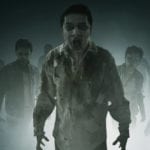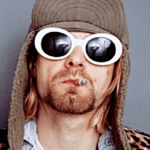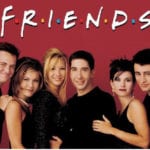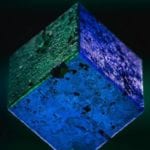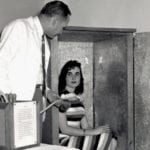 History
History  History
History  Weird Stuff
Weird Stuff 10 Wacky Conspiracy Theories You Will Need to Sit Down For
 Movies and TV
Movies and TV 10 Weird Ways That TV Shows Were Censored
 Our World
Our World 10 Places with Geological Features That Shouldn’t Exist
 Crime
Crime 10 Dark Details of the “Bodies in the Barrels” Murders
 Animals
Animals The Animal Kingdom’s 10 Greatest Dance Moves
 Movies and TV
Movies and TV 10 Box Office Bombs That We Should Have Predicted in 2025
 History
History 10 Extreme Laws That Tried to Engineer Society
 History
History 10 “Modern” Problems with Surprising Historical Analogs
 Health
Health 10 Everyday Activities That Secretly Alter Consciousness
 History
History 10 Dirty Government Secrets Revealed by Declassified Files
 Weird Stuff
Weird Stuff 10 Wacky Conspiracy Theories You Will Need to Sit Down For
 Movies and TV
Movies and TV 10 Weird Ways That TV Shows Were Censored
Who's Behind Listverse?

Jamie Frater
Head Editor
Jamie founded Listverse due to an insatiable desire to share fascinating, obscure, and bizarre facts. He has been a guest speaker on numerous national radio and television stations and is a five time published author.
More About Us Our World
Our World 10 Places with Geological Features That Shouldn’t Exist
 Crime
Crime 10 Dark Details of the “Bodies in the Barrels” Murders
 Animals
Animals The Animal Kingdom’s 10 Greatest Dance Moves
 Movies and TV
Movies and TV 10 Box Office Bombs That We Should Have Predicted in 2025
 History
History 10 Extreme Laws That Tried to Engineer Society
 History
History 10 “Modern” Problems with Surprising Historical Analogs
 Health
Health 10 Everyday Activities That Secretly Alter Consciousness
Top 10 Reasons to Admire John Lennon
John Lennon is one of the most influential people in history. His message of peace, love, and happiness will forever be remembered. In the 1960s and 70s, Lennon was revolutionary in changing negative social values. His lyrical tone was unmatched and musical prowess sensational. During his lifetime, John Lennon was the focus of a negative media campaign that saw his message as a threat.
Lennon was regularly battered by the press in the United States who fabricated stories to make him look bad. This trend has continued to the present day with hundreds of online articles giving material about isolated events in the life of Lennon and making false claims about his true personality. John Lennon was a musical pioneer and peaceful man. He helped introduce the world to rock & roll and free thought. For this, we will forever be grateful.
In a time of national struggle, mourning, and suffering we always turn to the music and message of John Lennon. On October 2, 2001, three weeks after the 9/11 terrorist attacks, a television fundraiser titled Come Together: A Night for John Lennon’s Words and Music was broadcast in the U.S. The event was held at Radio City Music Hall in New York City and dedicated to the people of New York. Thousands of spectators gathered and celebrated the message of John Lennon’s music.
A large number of popular musicians came out to attend the concert and perform Lennon’s most famous songs. The lineup included Sean Lennon, Rufus Wainwright, Alanis Morissette, Nelly Furtado, Stone Temple Pilots, Marc Anthony, Moby, Natalie Merchant, Cyndi Lauper, Lou Reed, Dave Mathews, and Kevin Spacey.
Spacey performed Lennon’s song Mind Games, which features the famous line: “Make love, not war.” Before his performance, Spacey said: “John Lennon was many things to many people, a poet, a rocker, a leader, a troublemaker, a father, a husband, a man. Growing up, to me, he was a hero. The work of John Lennon was marked by its exquisite beauty and by its brutal honesty. So in that vein, let me say, that while I’m both deeply honored to be here — I’m also incredibly pissed-off. I’m outraged because this passionate prophet of peace and so many others are not with us here — because we live in an all-too-violent world. And so in the spirit of this occasion it is up to all of us, to do what we can, not only to keep John’s songs alive, but help rebuild New York.”
When Beatlemania exploded in the middle of the 1960s, John Lennon was the target of unwarranted attacks by the media. He was asked absurd questions about his lyrical motivation. The pressure eventually took a toll and The Beatles stopped giving interviews or live shows. Lennon became interested in expanding his musical output and moved away from writing pop hits. This was met with hostility by the band’s corporate partners, who were only interested in making money. This was also met with hostility by Paul McCartney.
After the group disbanded in April of 1970, John Lennon did not focus his attention on material goods and moved toward spiritualism. Lennon and Yoko Ono undertook primal therapy with the guidance of Arthur Janov. McCartney released his first solo album titled McCartney in April of 1970. On December 11, 1970, John Lennon released his first solo album titled John Lennon/Plastic Ono Band. It was a major success and showed Lennon’s versatility. On December 31, 1970, Paul McCartney filed a lawsuit against the other three Beatles in London’s High Court for dissolution of a contractual partnership.
When asked how he would trace the breakup of The Beatles Lennon said: “After Brian (Epstein) died, we collapsed. Paul took over and supposedly led us, but what is leading us, when we went round in circles? That was the disintegration.”
A large number of false claims have been written about the true personality of John Lennon. Despite his incredible contributions to the world of music, some authors have attacked his character and falsified stories in order to sell books. In regard to woman, Cynthia Lennon wrote in her biography that John had knocked her head against the wall, which is unacceptable, but some authors have taken this information and written detailed accounts that are simply not true. John Lennon loved woman and often wrote about his admiration.
In the 1981 hit single Woman, Lennon wrote “Woman I can hardly express, my mixed emotions and thoughtlessness. After all I’m forever in your debt and woman I will try to express my inner feelings and thankfulness for showing me the meaning of success. Woman please let me explain I never meant to cause you sorrow or pain, I love you.” I think this quote is representative of a good-hearted man.
With the expansion of the Internet, some people have taken it upon themselves to publish material that was found in some bizarre books, like one written by a man named Albert Goldman. Goldman made some crazy claims about Lennon. Albert Goldman said that John Lennon was schizophrenic and a cold-blooded killer. That is ridiculous. All of these lies have caused some uneducated people to look back at Lennon’s music legacy in a false light, which only darkens the situation. Lennon once said: “Count your age by friends, not years. Count your life by smiles, not tears.”
As people reach new milestones in life, they learn from past experiences and change unhealthy habits. People grow, repent, and often times look for forgiveness. John Lennon had a rough childhood. He was born during the start of World War II and never really knew his father. When Alfred Lennon returned from battle in 1944, Julia Lennon was pregnant with another man’s child. John Lennon was forced to move in with his maternal aunt Mimi Smith, who was often dismissive of his musical ambitions and girlfriends. On July 15, 1958, when Lennon was 17-years-old, his mother was struck by a car and killed after visiting John’s home.
John Lennon’s first son Julian was born in 1963, during a decade when his father was one of the most popular musicians in the world. John was extremely busy writing music, performing live shows, and he was at the center of important world issues, including war and religion. Lennon tried to make time for his son, but it was a difficult. John even dedicated a collection of Beatles songs to Julian, including Good Night, which was originally written by Lennon as a lullaby.
Many people have highlighted a collection of quotes made by Julian after his father’s death. He said that Paul McCartney was more of a father than John, but this stance has since changed. In 2011, Julian wrote on his Facebook page about being snubbed by Paul McCartney. He is quoted: “What have I done to be ignored in such a way?” and even threatened “maybe now it’s time to tell the truth, me and my mother will not be eradicated from history.” Apparently, Julian was not invited to a collection of intimate gatherings. In 1975, when John Lennon was given the second chance of raising a boy, he put his musical career on hold and became a good father to Sean Lennon.
John Lennon demanded attention when he spoke. People wanted to know what he was feeling and his stance on certain issues. This is one of the reasons it was so sad when John Lennon was murdered. People will never again get the opportunity hear what this man was thinking. We are going to take a look at some of Lennon’s most important quotes.
“Everything is clearer when you’re in love.”
“For our last number, I’d like to ask your help. Would the people in the cheaper seats clap your hands and the rest of you, if you’ll, just rattle your jewelry.”
“Nothing really affected me until I heard Elvis. If there hadn’t been an Elvis, there wouldn’t have been the Beatles.”
“Jesus was all right, but his disciples were thick and ordinary.”
“We’re trying to sell peace, like a product, you know, and sell it like people sell soap or soft drinks. And it’s the only way to get people aware that peace is possible.”
“When I was about twelve, I used to think I must be a genius, but nobody’s noticed. Either I’m a genius or I’m mad, which is it? I can’t be mad because nobody’s put me away, therefore I’m a genius.”
“Reality leaves a lot to the imagination.”
“I don’t mind people putting us down, because if everybody really liked us, it would be a bore.”
“I’d like to say “thank you” on behalf of the group and ourselves and I hope we passed the audition.”
“I hope I’m living off the coast of Ireland or something like that, looking at a scrapbook of madness.”
John Lennon loved musical technology and was extremely important in bringing certain techniques to the front. In the 1960s, the Beatles helped influence the way music was recorded. The band had a strong impact on the evolution of sound, including techniques such as audio feedback, sampling, Artificial Double Tracking, and the use of multitrack recording machines. John Lennon was a musical master and would spend countless hours in the studio experimenting with new ideas.
In the early 1960s, Lennon demanded to know why the bass on a certain Wilson Pickett record far exceeded the bass on any Beatles records. This caused the group to experiment with a loudspeaker and microphone. For Paperback Writer McCartney said: “we boosted the bass by using a loudspeaker as a microphone. We positioned it directly in front of the bass speaker.” This caused the moving diaphragm of the second speaker to make electric current. “It was the first time that the bass sound had been heard in all its excitement.”
Audio feedback is a musical technique which includes adding a sound loop between an audio input and output. In the early 1960s, Lennon experimented with audio feedback and the song I Feel Fine (1964) was the first single to use guitar feedback on a record. Specifically, Lennon put his acoustic electric guitar against an amplifier and the ‘A’ string on McCartney’s bass gave feedback causing distortion. Artists such as The Kinks and The Who had already used feedback live, but The Beatles were the first to put it on vinyl.
In the middle of the 1960s, John Lennon asked an engineer at Abbey Road Studio named Ken Townsend if there was a way for the Beatles to get the sound of double-tracked vocals without actually doing the work. Townsend devised Artificial Double Tracking or “ADT” and Lennon named the process “flanging.” ADT greatly influenced recording and Lennon was a master of it. Today, the process is widely used and known as automatic double tracking. John Lennon was also instrumental in popularizing the concept of backmasking. The first song to feature a backmasking message was Rain, which was released by The Beatles in June 1966.
Between the years of 1962 to 1970, The Beatles released 27 songs that went to #1 in the United Kingdom or the United States. 26 of these songs are attributed to the songwriting partnership of Lennon-McCartney. In fact, Lennon-McCartney is the most successful songwriting duo in history. When they were teenagers, John and Paul agreed that their songs would be credited to both parties.
In the early 1960s, Lennon and McCartney would often work “eyeball to eyeball” and bounce ideas off each other while writing songs. In a breakdown of these 27 #1 hit singles, 14 are thought to have been written primarily by McCartney, 7 by Lennon, 5 as collaboration, and 1 by George Harrison. It was rare that a song was published without some input from both Lennon and McCartney. During this time in history, the Lennon-McCartney writing style was unique and controversial. Their lyrical prowess was innovative and The Beatles helped spawn a new era of popular music.
In many of The Beatles songs, John Lennon writes about friendship, love, happiness, peace, and freedom. Some of his most famous lyrical masterpieces are Imagine, Come Together, All You Need is Love, I Feel Fine, Across the Universe, In My Life, Nowhere Man, and Strawberry Field Forever. John Lennon was a master of arrangement and understood how to develop of hit single. Later in his career, he wrote protest songs that examined world issues.
There is no question that John Lennon’s overall message remains 32 years after his death. “When I went to school, they asked me what I wanted to be when I grew up. I wrote down “happy.” They told me I didn’t understand the assignment, and I told them they didn’t understand life.”
In the 1960s, the spread of rock music had a powerful impact on society. Unlike anything government officials had seen before, music began to influence life activities, goals, fashion, attitudes, and even language. The Beatles became social giants and whatever they said or did was acceptable, especially for young people. The band taught people how to celebrate freedom and changed social norms. Their expression helped pave the way for modern individuality in music.
It was important for John Lennon to get his message of peace across to children. In 1969, Lennon was at the King Edward Hotel in Toronto when he came across a 14-year-old boy named Jerry Levitan who was attempting to meet his idol. Levitan said to Lennon: “John, can I come back later and bring a tape recorder and do an interview on peace, so I can let kids listen to it?” Lennon replied: “Yeah, great! Yoko, Derek, this kid has a good idea, he’s going to do an interview and take it to his school. That’s why we’re doing this! It’s great, great, great! Set it up!”
The next day Levitan returned and interviewed John Lennon for 30 minutes. Lennon was very nice and discussed his mission of peace and views on war. He is quoted: “Ask them to show you one revolution that turned out to be what they promised. Protest, but protest nonviolently because violence begets violence.” In 2007, Jerry Levitan produced a short 5 minute animated film with excerpts from the conversation. It won a collection of awards and is a must watch.
John Lennon has one of the most unique voices in the history of music. His instinctive sound is immediately identifiable, similar to Jagger, Dylan, and Mercury. Lennon performed the lead vocals on a number of Beatles songs without McCartney, including All You Need is Love, Help, Come Together, Baby, You’re a Rich Man, I Feel Fine, Rain, Revolution, Ticket to Ride, Twist and Shout, You Can’t Do That, Real Love, and I Should Have Known Better. Lennon and McCartney also shared the lead vocals on a large collection of #1 singles.
John Lennon is not known for having a finely tuned vocal range and didn’t use a coach. He had a soothing tone and used raspy interpretations in his lyrics. Lennon had more edge to his sound than McCartney and helped make The Beatles unique. John was known for his strong emotional singing and performances. Paul McCartney is also a great singer. The pair used their strengths to produce an amazing collaboration. John Lennon was also interested in altering his recorded voice to produce new sounds.
Lennon was a musical master and capable of playing a wide range of instruments. He wasn’t as good a guitar player as George Harrison, but who is. Lennon strongly contributed to the band’s sound. Lennon was once asked if he was a great guitarist and replied: “It depends on what kind of guitarist. I’m okay, I’m not technically good, but I can make it howl and move. I was rhythm guitarist. It’s an important job. I can make a band drive.” He later said: “I’m really very embarrassed about my guitar playing, in one way, because it’s very poor. I wish I could do it like B.B. King. If you would put me with B.B. King, I would feel real silly. I’m an artist, and if you give me a tuba, I’ll bring you something out of it.”
In the summer of 1969, at the height of the Vietnam War protest movement, John Lennon wrote and recorded a song simply titled “Give Peace a Chance.” The song became an international hit and fueled a large collection of anti-war protests in the late 1960s and early 1970s. At this time in history, John Lennon and Yoko Ono were important peace activists. They organized famous rallies and developed protest concepts such as bagism (wearing a bag) and bed peace.
The protests even caught the attention of the U.S. government and John Lennon experienced harassment from the CIA. In 1973, he was sent a deportation notice, informing Lennon that “his temporary stay in the USA was now over.” This ruling was later overturned after Richard Nixon left office. In 1976, Lennon received his “green card” certifying his permanent residency in the U.S.
On October 15, 1969, the song Give Peace a Chance was sung by 500,000 demonstrators in Washington, DC at the Vietnam Moratorium Day. The protest was led by singer Pete Seeger, who shouted phrases between the chorus such as, “Are you listening, Nixon?” and “Are you listening, Agnew?” In 1971, Lennon released the popular protest song Happy Xmas (War Is Over). In 1972, he participated in the John Sinclair Freedom Rally, which was in support of John Sinclair who was given a ten year jail sentence for the possession of two marijuana cigarettes. When you examine a list of influential protest singers, John Lennon is one of the most important.

